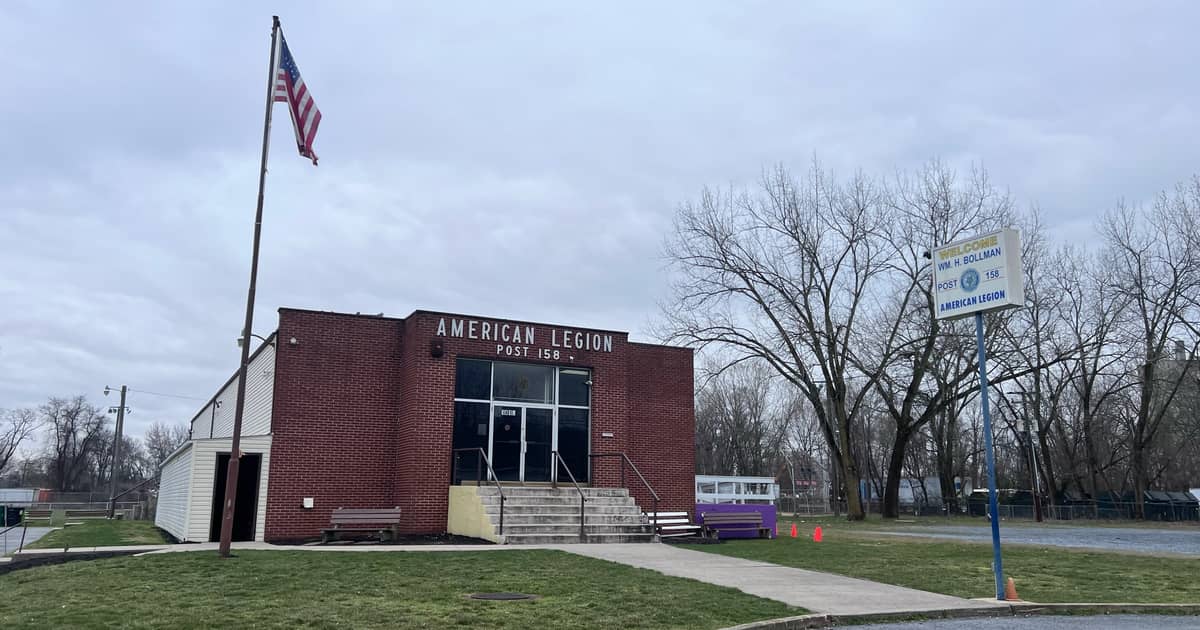A law designed to support nonprofits, being used by an organization with a lapsed nonprofit status. An American Legion post undergoing a reorganization overdue by a decade or more. A litany of charges by state police over noncompliance. And a state agency that can’t answer a seemingly straightforward question.
In the aftermath of LebTown’s story in April about the closure of American Legion Post 158 in Lebanon, we heard from post members who felt that our original story missed key pieces of context. Some went as far as to suggest the article was biased.
Read More: Canteen at American Legion Post 158 in Lebanon closed while post reorganizes
While LebTown rejects those claims, over the past two months we have continued to dig into the particulars of what happened to Post 158, and reexamined the original statements made by post leadership about the situation, with the goal of understanding where post leadership past and present may have run afoul of the law in its more than a decade of operation since losing its 501(c)19 nonprofit status with the IRS in 2010 due to non-filing of Form 990s for three consecutive years.
LebTown’s investigation focused on two key questions – Did the post pay taxes after losing its nonprofit status? And did the post benefit from laws designed to support nonprofits over that period, specifically the Local Option Small Games of Chance Act?
We set out to answer both questions as best we could by relying on publicly available information, obtained through Right-to-Know requests and questions to relevant agencies, as well as additional interviews.
Did the post pay taxes after losing its nonprofit status?
Unfortunately, with the tax question at least, there are very limited options for arriving at an ironclad answer through public documents. Taxpayer confidentiality laws prohibit the Pennsylvania Department of Revenue from disclosing taxpayer account information, such as the remit or non-remit of sales tax and liquor tax by a specific organization.
Club members have said or implied that the organization didn’t pay taxes after it lost its nonprofit status.
“I don’t know how they got away without paying taxes or anything,” said former member Denny Jacobs.
Former board member Robert Lozada said that his understanding was the post hadn’t paid its taxes the last 10 to 15 years.
Post 158 commander Cedric Jordan said that the post hadn’t filed Form 990s since 2008, and that he doesn’t believe it was paying any state or federal taxes either.
Jordan said that he’s not sure if the post will have to make whole on any outstanding state or federal tax liabilities as part of its reorganization efforts.
“If we do, we do,” said Jordan. “We’re just going to have to cross that bridge when we get there.”
Jordan said that he did not flag the issue to any tax authorities upon discovering that the nonprofit status had lapsed, but that he did take initial steps at the time towards restoring the post’s tax-exempt status. Jordan said that the post was trying to stay underneath the radar from a tax perspective while they got things squared away.
American Legion Department of Pennsylvania adjutant J. Woody Hogan said that he didn’t have any knowledge of whether the post was paying its taxes. Hogan mentioned that with 700 posts in the state, and only 10 employees in the state organization, it’s not feasible for them to check up on each individual post.
Hogan said that the state organization does not become aware of any potential issues unless post members report them to headquarters.
“They’re autonomous, they’re in control of their own membership,” he said. “They’ve been running well for 100 years.”

Jordan and Hogan have cast blame for the post’s predicament onto its home association, an associated group that manages the post’s canteen, or bar, as is typical for American Legion chapters. Former home association president Mike Miller rejects those claims, and says that he thinks the issues entirely stem from actions or inactions taken by former post & home association president Houston L. Cunningham.
Although Jordan and Hogan have accused the home association and Miller of financial misdeeds, Miller rebuffs those allegations outright and blames Jordan for turning an administrative headache into an ongoing and highly combative internal and external feud over the Lebanon veterans organization.
LebTown attempts to contact Cunningham were not successful.
Jordan and Miller became heads of the post and home association, respectively, in early 2021, and both said that they weren’t aware that the post had lost its tax-exempt status until taking their positions.
“No one knew,” said Miller, adding that Cunningham had singular sway in the organization over the last few decades or more, and held the top position of both the post and home association up until suffering a health crisis that caused him to relinquish control of both.
Miller acknowledged that potential outstanding tax liabilities might be the biggest roadblock to the post’s successful reorganization.
“That’s 15 years of back taxes,” he said. “That’s a lot of money.”
Miller added that there’s a chance the post would be able to get the IRS, county, and state to forgive the back taxes.
Even once the Department of Revenue begins investigating an instance of unpaid delinquent taxes, that information only makes it onto the public record in limited situations.
Department of Revenue spokesperson Jeffrey Johnson said the agency works with taxpayers to resolve any issues related to their state tax obligations, and that a number of enforcement steps are available in the event that the Department of Revenue identifies a delinquent taxpayer who is not responsive to the department’s resolution attempts.
One way that unpaid delinquent taxes can become public record is through a tax lien, or an outstanding debt applied directly to real property that ensures the state gets paid before any other transaction can take place.
Lebanon County court records do not show any liens currently on the post’s 1410 Lehman St. headquarters.
Did the post benefit from laws designed to support nonprofits over that period, specifically the Local Option Small Games of Chance Act?
One of the first things LebTown did while reporting this story was file a Right-to-Know request to the Lebanon County Treasurer for any small games of chance applications submitted by American Legion Post 158.
LebTown was curious to see who had filed for the license and whether it was possible that any applications contained fraudulent information regarding the post’s tax-exempt status.
But does an organization even need to be a nonprofit for small games of chance? You’d think this is an easy question to answer – the legislative intent of the act is described as enabling small games of chance for “certain nonprofit associations” to fundraise. However, the Department of Revenue declined to answer a direct question from LebTown on whether an organization must have a valid 501(c)19 designation with the IRS to be considered a “fraternal or veterans’ organization.”
“I would encourage you to read the SGOC statute,” said the spokesperson. “There are definitions for an ‘eligible organization’ and ‘fraternal organization’ in the law.”
LebTown had already read the law, which is ambiguous. Here’s how veterans organization is defined in the statute (emphasis added):
“Veterans organization.” Any congressionally chartered organization within this Commonwealth, or any branch or lodge or chapter of a nonprofit national or State organization within this Commonwealth, the membership of which consists of individuals who were members of the armed services or armed forces of the United States. The term shall also include a home association, affiliate or other nonprofit organization established by or in cooperation with the veterans organization to provide services to veterans or to the community. Such organizations shall have been in existence in this Commonwealth fulfilling their purposes for one year prior to the date of application for a license. (Def. amended Nov. 27, 2013, P.L.1062, No.92)
In LebTown’s interpretation, this law is written so that a chapter could have had its nonprofit status revoked, and be operating in breach of national bylaws, but still apply for a license from a local authority. The Department of Revenue declined to clarify or explain this apparent loophole.
However, this question could be moot, as Small Games of Chance Licenses are obtained using the Eligible Organizations Games of Chance Application (PDF), which clearly states that all applications must include documentation of tax-exempt status.

The Department of Revenue declined to confirm that proof of tax-exempt status is indeed required to obtain a Small Games of Chance License, as well as whether the failure to provide this documentation – or providing false documentation – would constitute filing a false or fraudulent application.
Instead, the Department of Revenue deferred to the county treasurer’s office as they are the licensing authority.
The Lebanon County Treasurer’s Office has in its records applications by Post 158 for small games of chance dating back to 2015.
For applications submitted from 2015 to 2019, American Legion Post 158 did not include a copy of a tax exemption letter from the IRS. For applications submitted in 2020 and 2022, they included a handwritten note stating that the post’s tax-exempt approval letter had been “destroyed in the flood.”

It’s not clear what organization is registered to the tax identification number included in the note (23-0344050), but it’s not listed in the IRS database of tax-exempt organizations, and it’s not the tax identification number of American Legion Post 158, which is 25-6089999, or that of the American Legion Post 158 Auxiliary, which is 23-2245679. A LebTown search of Pennsylvania corporate records previously failed to turn up incorporation records for a home association entity.
The first five applications the county had on record – submitted between July 13, 2015, and Sept. 4, 2019 – were submitted by Cunningham.
The next three applications, including the two that had a copy of the handwritten note, were submitted by Edward McCann, who is identified as a post trustee and the post’s service officer, depending on the application.
McCann said that he was always under the impression that the organization was a nonprofit association.
“I did what I was told,” said McCann.
McCann declined to name who gave him the instructions.
“I am totally done with that club and I don’t want to be a member anymore,” said McCann.
McCann said that the tax information would have come from “behind the bar” and that he didn’t know what flood was referenced, noting that the 1972 flood was the only one that came to mind.
Jordan said that he hadn’t seen the applications and that he didn’t instruct anyone to apply for a Small Games of Chance license. He also said that he believed that the post’s home association president, Miller, had overseen the application process.
Miller said that he had drafted the applications for the small games license in 2021 and 2022, and that Jordan had helped secure the license in December 2021 through an in-person visit to the Lebanon County Treasurer’s Office. Miller said that he had not seen the handwritten “flood” note before it was shown to him by a Bureau of Liquor Control Enforcement trooper earlier this year, and he did not know how it came to be attached to the 2022 application.
Miller said that the flood may possibly be a reference to a 2010 incident where the basement of the post building was flooded with several feet of water.
Lebanon County treasurer Sallie Neuin said that her office’s opinion is that proof of tax-exempt status is required on applications.
“We also believed that Legion 158 was a chapter of the State organization and had been treated as such year after year,” said Neuin. “With recent information received from the State organization that they are not affiliated, I will be suspending the SGOC license based on failure to provide their own 501(c), until the proper certifications are produced.”
Neuin said that the Department of Revenue has not provided any specific direction on how applications should be processed.
“The Department of Revenue consistently refers back to county treasurers for their own interpretation,” said Neuin.
Neuin added that she believes the treasurer’s office has the authority to validate information submitted and to audit for the required documents.
Neuin said that in the future, the treasurer’s office will be more stringent on this.
“They were supposed to get me their (tax-exempt) letters, but they never got them to us,” she said.
Neuin said that the organization shouldn’t have been able to renew their license as long as it was. “It’s the Legion, a veterans organization, and you take their word on it.”
Neuin said that every time the organization renewed its license, they requested the EIN and tax-exempt information.
“Now we have changed our procedures,” she said. “We changed them recently.”
Neuin said that the copies of tax-exempt status must be included with each Eligible Organizations Games of Chance Application.
“This was in the past and we should been more stringent with it and we just weren’t,” said Neuin. “It should have been done and it wasn’t.”
Neuin said she wasn’t aware of any other organizations who might fall into the same category as American Legion Post 158.
Neuin noted that the lack of guidance from the state makes the whole situation more confusing, referring in part to the confusion highlighted by LebTown between the statute and the Department of Revenue’s application.
“They give us no direction,” said Neuin. “We can call up there and they don’t give us any direction.”
Neuin said that the treasurer’s office is now enforcing the application requirements more stringently.
“They have to show us their their tax-exempt status,” said Neuin. “Now they’re going to have to show us that 501(c) or tax-exempt letter. They’re going to have to show us that stuff from now on.”
Neuin noted that there’s public confusion about Small Games of Chance regulations, and that the treasurer’s office is regularly contacted by individuals who are seeking a license for a fundraiser but unable to get one due to not being a nonprofit organization.
Neuin said she is moving to revoke the license and that the post will have to apply for a new license when they’re reorganized.
“It should have stopped it and didn’t,” said Neuin. “It’s not going to happen again.”
Jordan also acknowledged the ambiguity with the law, and said that technically as an American Legion affiliate, the post might not have needed to be nonprofit itself. “I cut Sallie a break at the end,” said Jordan, in reference to the confusion.
Miller said that he and others associated with the organization remain unclear how Cunningham had managed to repeatedly secure the license.
Hogan said that his understanding was that only nonprofits can get a small games license, and he was unaware of any provision for the post to secure a SGOC license by piggybacking on the Department of Pennsylvania’s nonprofit status. “They have to use their own EIN,” said Hogan.
Hogan said that in his opinion, the approval of small games licenses for the post in apparent breach of the law was part of the problem. “That lets a rogue home association like we had in 158 continue to be rogue because the people who enforce the laws don’t do it,” said Hogan.
Hogan said that if the post’s nonprofit status had been checked, the organization “couldn’t have continued to do the malfeasance they were doing in that post carte blanche.”
Hogan added that the Department of Pennsylvania doesn’t enforce those laws, and that it wouldn’t have had any knowledge that the Lebanon County treasurer was allowing the post/home association to secure the licenses after having lost its nonprofit status.
LebTown was not able to determine based on public records how much revenue American Legion Post 158 has generated through small games of chance since the act was introduced, but by their own reporting they seem to have netted approximately $145,000 over the last two years alone.
As part of the application, organizations are required to include an annual schedule submitted to the Department of Revenue showing their monthly net proceeds on small games of chance. This annual report does not need to be submitted if organizations earned less than $20,000 in a year.
The post only appears to have filed one annual report with the Department of Revenue, using the tax identifier listed on the handwritten note, for 2021, during which the organization claimed approximately $65,000 in net proceeds. That report was filed in January 2022. In the application for 2023, submitted in December 2022, the club included a copy of an annual report showing $80,000 in net proceeds. That report does not appear to have been filed with the Department of Revenue.
Johnson said that when the Department of Revenue becomes aware of a small games of chance violation, it notifies the Pennsylvania State Police Bureau of Liquor Control Enforcement.
It’s not clear what brought Post 158’s noncompliance onto the Bureau of Liquor Control Enforcement’s enforcement – LebTown’s article on April 4 noted that it was unclear how the canteen had offered small games of chance – but a week later, on April 13, the bureau included an enforcement action against the post with a litany of charges:
- Did not comply with the requirements for operating pull-tabs, raffles, and drawings
- Failed to maintain complete and truthful records covering the operation of the licensed business for a period of two years
- Failed to maintain proceeds from games of chance in a bank account separate from all other funds
- Failed to submit annual reports to the Pennsylvania Department of Revenue
- Failed to adhere to constitution and/or by-laws
- Officers of the parent lodge automatically became officers of the licensed club in violation of the liquor code
- Obtained liquor from sources other than Pennsylvania State Stores
- Failed to maintain records in conformity with the provision of the Liquor Code and Title 40 of the Pennsylvania Code
- Failed to keep on the premises complete and truthful records covering the operation of the licensed business
- Smoking in public place where smoking is prohibited
Jordan said the fine amount will be around $9,000, and that the post will have to go through adjudication as part of the enforcement action.
Animosity and infighting abound, but hope remains for post to resume veterans services
LebTown has reported on myriad stories of a controversial nature – from a pandemic to Republican commissioner primaries to solar farms, school policies, and sprawling warehouses – and none of those topics triggered an influx of as vociferous commentary to LebTown as did our earlier article about the situation with Post 158.
Some have claimed that the story offered by Hogan and Jordan to LebTown about the home association ignored or obfuscated the post’s own role in the situation. On the other side, Jordan has doubled down on his accusations, and gone from a reluctance to name Miller outright when speaking on the record for our first article, to outright accusing Miller of “ripping the place off left and right.”
Miller denies those allegations categorically, and offered his own critique of Jordan failing to abide by good accounting practices, such as allegedly reimbursing himself for expenses without receipts or at amounts that differed from what receipts have shown.
Jordan said that he was speaking to Long-Brightbill attorney Greer Anderson about possible referral of the situation to Lebanon County District Attorney Pier Hess Graf. Anderson acknowledged that he’s spoke to Jordan preliminarily, but was unable to confirm anything further than that and said he hasn’t explored the matter thoroughly with Jordan.
A number of members, including Miller, have told LebTown that the experience has caused them either to leave the post altogether, or be totally uninterested in future leadership positions with it.
“I’ll still remain a member of the post but no, I will not be on any board whatsoever,” said Miller. “I do not need the headaches.”
American Legion Post 158 Auxiliary president Carla Bergman said that Jordan’s statements to LebTown about the home association seemed like deflection to her. “The home association never gave the auxiliary any problems,” said Bergman.
Bergman said she didn’t have any comment on what the home association was accused of, and had no idea whether there may have been financial mismanagement, but she did have several comments on Jordan.
Bergman described behavior by Jordan that she found concerning, including a verbal assault of Miller’s wife, attempting to oust another board member, and stalling on addressing the lapsed nonprofit status.
Jordan shared video of the incident in question with Miller’s wife, although the recording begins midway through the encounter and it’s not clear how it started. At minimum the video portrays a highly tense and alcohol-fueled encounter that signals deep underlying conflict within the veterans organization.
Miller said that Jordan has verbally assaulted a lot of people, and he thinks the encounter was meant to get a rise out of Miller, who had defeated Jordan for the home association presidency. Miller said that Jordan’s defeat for the home association presidency may be at the root for the animosity Jordan has towards to him.
Miller also said he overheard Jordan saying that he had called the Liquor Control Board regarding issues with the home association earlier in the year.
Former board member Lozada said that Jordan’s defeat was a triggering factor for the animosity. “It pissed him off more,” said Lozada. “More hating everyone, and threatening people.”
Lozada said he thinks Miller did nothing wrong. “He walked into Houston’s mess,” he said.
Lozada said that he himself fell victim to a vendetta by Jordan, a childhood friend of his, after Lozada, in his role as financial officer, questioned invoices that had been processed without board approval. Lozada said that soon after that, he attended what he called an “ambush meeting” where he was voted out, supposedly over a DUI he had in his past history. Lozada said that Jordan “kinda scared the rest of the board into it,” and that he was soon after reinstated at a meeting attended by Department of Pennsylvania Commander Matt Hockley.
Lozada, however, said he had experienced enough by that point and resigned immediately following his reinstatement.
“I don’t want to be part of any past, present, or future shenanigans,” said Lozada.
Lozada said at that same meeting, Hockley suggested that the Department of Pennsylvania may have suspected things weren’t right in Post 158, but wasn’t able to do anything about the situation since Cunningham refused to let them get involved or attend post meetings.
Jordan claims that the reinstatement was in error, and said Lozada could not be part of the board due to a past DUI. However, Jordan also said that he wasn’t trying to vote Lozada out, “I was trying to tell him to run.” (State liquor laws do give the licensing board discretion to deny an application if an associated board member or partner had been convicted or found guilty of a felony within the last five years, however the denial isn’t automatic and in any event Lozada was never found guilty or charged with a felony, within the last five years or at any time.)
Bergman said she doesn’t believe anyone outside of the board knew that the nonprofit status had lapsed prior to when Jordan took his position.
However, Bergman and others described frustration at how long it took Jordan to address the situation.
“The auxiliary would like to know why it took two or three years to get to this step in the process,” said Bergman, referring to the reorganization efforts.
Miller echoed those comments. He said that when he, Jordan, and others discovered that the 501(c)19 status had been revoked, he and Jordan went into Lebanon attorney George Christianson’s office to discuss the issue. Miller relayed that Jordan wanted to take charge of the relationship with Christianson based on knowing him previously.
However, Miller said that Jordan then stalled on the process for more than a year, and misrepresented what Christianson had told him regarding the attorney’s capacity to take the post through the IRS process.
“Every month at the meeting we asked what was going on with it,” said Miller.
Christianson told LebTown that Jordan did engage him in the fall of 2021 regarding the post’s application to regain tax-exempt status.
“I told him that those formats and forms I would help him with, but I would not go through that process,” said Christianson. “I went through that process once or twice but I’m too old to go through that again.”
Christianson noted that the application is more than 20 pages long and requires a ton of information.
“I told (Jordan) that I would help him with it, but I was not going to process it with him,” said Christianson.
Christianson said he directed Jordan to an accountant who would be in a better position to process the necessary information.
Miller said that when he talked to Christianson, the attorney related to him that he wasn’t able to help Jordan complete the process as the attorney costs would be very high given the complexity of the application process.
Jordan maintains that he thought Christianson was handling the application, and that possibly there was miscommunication or a misunderstanding between them.
Jordan said he never did really start working with the accountant.
“I wasn’t worried as much about the numbers point as just getting the application submitted,” said Jordan.
Jordan said that the effort stalled over 2022 and resumed last fall when Bill Houser became involved with the organization and started helping drive things forward.
“To me, it wasn’t misunderstanding or miscommunication,” said Miller. “He was telling us, ‘It’s almost done, it’s almost there.’ We asked about it every month.”
Lozada said he feels Jordan lied to them for two years. “He kept telling us he’s working on the 501(c),” he said.
Miller said that, in retrospect, he thinks that he should have resigned and walked away the moment he found out the organization didn’t have its tax-exempt status anymore.
Still, those involved hope that the post can successfully reorganize and provide services to local veterans.
Bergman said it’s difficult to see how the post will rebound for this, but she hopes it does.
“I would love to see this place come back better than ever,” said Bergman. “That’s what the home association and the auxiliary were working towards.”
Bergman said that the bickering and the fighting impeded those plans.
“The stress is a lot less on us right now because we’re not dealing with it,” said Bergman,
“Do I want to see it come back? Yeah, it’s nostalgic for me. My grandfather was a member there. My uncles were members there. It has a special place in my heart.”
“I would hope that the rogue home association didn’t kill a 100-year-old post,” said Hogan. “As they long as they follow the constitution and bylaws, they’ll be fine like the rest of the posts in this commonwealth.”
He added: “We have tons of successful posts in the Department of Pennsylvania. I would hope Lebanon can become one again.”
Questions about this story? Suggestions for a future LebTown article? Reach our newsroom using this contact form and we’ll do our best to get back to you.

Keep local news strong.
Cancel anytime.
Monthly Subscription
🌟 Annual Subscription
- Still no paywall!
- Fewer ads
- Exclusive events and emails
- All monthly benefits
- Most popular option
- Make a bigger impact
Already a member? Log in here to hide these messages
You know us because we live here too. LebTown’s credibility comes from showing up, listening, and reporting on Lebanon County with care and accuracy. Support your neighbors in the newsroom with a monthly or annual membership, or make a one-time contribution. Cancel anytime.
Editor’s note: A quote from Lozada which suggested that Jordan was “blindsided” by discovering that the post had lost its tax-exempt status was removed after publication, as Lozada says he actually meant that Miller was blindsided by the situation. Lozada said he suspects Jordan may have known the post had lost its tax-exempt status before he took office, but he doesn’t know that for sure.























